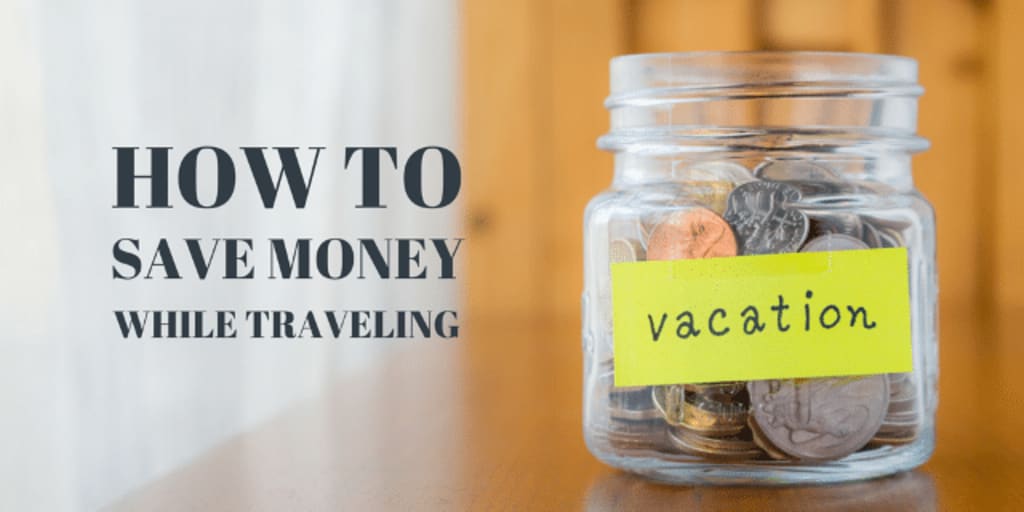How to Save Money While Traveling?
How to Save Money While Traveling?

How to Save Money While Traveling?
Traveling can be an exciting experience, but it can also be expensive. However, with careful planning and budgeting, you can save money while still enjoying your trip. Here are some tips to help you save money while traveling:
Set a budget: Before you start your trip, determine how much you can afford to spend each day and stick to it. This will help you prioritize your expenses and avoid overspending.
Travel during off-peak seasons: Prices for flights, accommodations, and attractions tend to be lower during off-peak seasons. Research the best time to visit your destination to take advantage of lower prices.
Be flexible with your travel dates: If your travel dates are flexible, try to book flights and accommodations during weekdays or shoulder seasons when prices are generally lower.
Compare prices: Use online travel platforms to compare prices for flights, accommodations, and activities. Look for discounts, deals, and package offers that can help you save money.
Choose budget accommodations: Consider staying in budget-friendly accommodations such as hostels, guesthouses, or vacation rentals instead of luxury hotels. You can also explore options like couchsurfing or house-sitting to save on accommodation costs.
Cook your own meals: Eating out can be one of the biggest expenses while traveling. Whenever possible, prepare your own meals using local ingredients. Visit local markets and grocery stores to get a taste of the local cuisine at a fraction of the cost.
Use public transportation: Instead of relying on taxis or rental cars, use public transportation like buses, trains, or subways. Public transportation is often cheaper and can give you a more authentic experience of the destination.
Walk or bike: Explore your destination on foot or rent a bike instead of taking taxis or using public transportation for short distances. Not only will you save money, but you'll also get to see more of the local culture.
Look for free or low-cost activities: Research free or low-cost attractions, museums, parks, and events at your destination. Many cities offer free walking tours or have discounted admission days to popular tourist spots.
Use local currency wisely: Be mindful of currency exchange rates and transaction fees. Use credit cards that offer no foreign transaction fees and withdraw cash from ATMs in larger amounts to minimize fees.
Stay connected smartly: Roaming charges for data and calls can add up quickly. Consider purchasing a local SIM card or using Wi-Fi in cafes and accommodations to stay connected without incurring hefty charges.
Pack wisely: Pack light to avoid excess baggage fees. Research the baggage allowances of your airline and pack versatile clothing that can be mixed and matched for different occasions.
Remember, saving money while traveling requires a balance between budgeting and enjoying your trip. Be mindful of your expenses, but also allow yourself to have memorable experiences.
How can I save money while Travelling?
Saving money while traveling is a common concern for many people. Here are some practical tips to help you save money while still having a great travel experience:
Plan and research in advance: Planning ahead allows you to take advantage of early booking discounts and find the best deals on flights, accommodations, and activities. Research your destination to find affordable options and budget-friendly attractions.
Travel during off-peak seasons: Prices for flights, accommodations, and attractions are usually lower during off-peak seasons when there is less demand. Consider traveling during these times to save money.
Be flexible with your travel dates: If possible, be flexible with your travel dates. Adjusting your departure or return dates by a few days can sometimes result in significant savings on flights and accommodations.
Choose budget accommodations: Consider staying in budget-friendly accommodations such as hostels, guesthouses, or budget hotels. These options are often cheaper than luxury hotels and can still provide a comfortable stay.
Cook your own meals: Eating out for every meal can be expensive. If you have access to a kitchen or kitchenette, consider cooking some of your meals. Visit local markets to buy fresh produce and groceries, which can be a more cost-effective way to experience local cuisine.
Use public transportation: Utilize public transportation systems like buses, trains, or subways instead of taxis or rental cars. Public transportation is often cheaper and can give you a more authentic local experience.
Walk or bike: Explore your destination on foot or rent a bike instead of taking taxis or public transportation for short distances. Not only will you save money, but you'll also get to experience the destination in a more intimate way.
Look for free or low-cost activities: Research and take advantage of free or low-cost attractions, museums, parks, and events at your destination. Many cities offer free walking tours or have discounted admission days to popular tourist spots.
Use travel rewards and discounts: If you have travel rewards or loyalty points, consider using them to offset some of your expenses. Additionally, look for discounts and deals on travel websites, apps, or through membership programs.
Stay connected smartly: Avoid excessive roaming charges by using Wi-Fi in cafes, accommodations, or public areas. Consider purchasing a local SIM card or using portable Wi-Fi devices to stay connected without incurring hefty fees.
Limit souvenir expenses: Souvenirs can quickly add up and eat into your travel budget. Instead of buying expensive souvenirs, consider collecting smaller, inexpensive items or focus on experiences and photographs as mementos.
Set a daily budget: Determine how much you can afford to spend each day and stick to it. Keep track of your expenses to ensure you're staying within your budget.
Remember, saving money doesn't mean sacrificing your travel experience. It's about making smart choices, being mindful of your expenses, and finding a balance between saving and enjoying your trip.
How can I save money while traveling in India?
Traveling in India can be a fantastic experience, and there are several ways you can save money while exploring this diverse country. Here are some tips to help you save money while traveling in India:
Choose budget accommodations: India offers a wide range of budget accommodations such as guesthouses, hostels, and budget hotels. These options are often cheaper than luxury hotels but still provide comfortable and clean accommodations. Consider staying in budget accommodations to save money.
Eat at local restaurants and street food stalls: Indian cuisine is known for its delicious street food. Instead of dining at upscale restaurants, try the local eateries and street food stalls, which offer authentic flavors at much lower prices. Just make sure to choose clean and hygienic places.
Travel by public transportation: India has an extensive network of buses and trains that connect various cities and towns. Opt for public transportation instead of private taxis or car rentals to save money on transportation costs. Trains are often the most economical and efficient mode of long-distance travel.
Use shared transportation services: In cities, use shared transportation services like rickshaws or shared cabs to get around. They are usually cheaper than private taxis and offer a more local experience. Make sure to negotiate and agree on a fare before starting your journey.
Bargain and negotiate prices: Bargaining is common in many markets and street shops in India. Don't hesitate to negotiate prices, especially in local markets or while shopping for souvenirs. Remember to be respectful and friendly during the bargaining process.
Visit free or low-cost attractions: India is rich in historical and cultural sites, and many of them are either free or have low admission fees. Research and prioritize visiting these attractions to save money while still immersing yourself in the country's heritage.
Use local SIM cards and affordable data plans: Buying a local SIM card can provide you with affordable calling and data services. This way, you can stay connected without incurring high roaming charges.
Travel during off-peak seasons: Peak tourist seasons in India, such as winter and major festivals, can drive up prices for flights, accommodations, and attractions. Traveling during off-peak seasons can help you secure better deals and save money.
Stay hydrated with filtered water: Instead of buying bottled water, carry a reusable water bottle and use water purification methods like filtering or boiling to stay hydrated. This will save you money and reduce plastic waste.
Plan your itinerary efficiently: Carefully plan your itinerary to minimize unnecessary travel expenses. Opt for destinations that are close to each other, reducing the need for additional flights or long-distance travel.
Dress appropriately: When visiting religious sites, make sure to dress respectfully to avoid any charges for rented clothing or shawls. It's a good idea to carry a scarf or shawl with you to cover your shoulders or head when required.
Learn basic phrases in the local language: Learning a few basic phrases in Hindi or the local language can go a long way in building rapport with locals. This can sometimes lead to better deals or discounts when interacting with vendors or negotiating prices.
Remember, India is a diverse country with a wide range of prices and options. By being mindful of your expenses and making smart choices, you can have a fulfilling travel experience while saving money.
Can you leave India with rupees?
Yes, you can leave India with Indian rupees (INR), but there are certain restrictions on the amount of currency you can take out of the country. According to the regulations of the Reserve Bank of India (RBI), residents of India and non-residents are allowed to take out up to INR 25,000 per person in Indian currency notes. This limit is subject to change, so it's advisable to check with the RBI or your local bank for the most up-to-date information before your departure.
If you have a larger amount of rupees that you want to convert back to your home currency, you can visit authorized currency exchange providers or banks in India to convert the excess rupees into a foreign currency of your choice before leaving the country.
It's worth noting that many countries have regulations on the amount of currency you can bring in without declaring it, so it's essential to check the customs regulations of your destination country to ensure compliance.
How many rupees can you leave India with?
As of my knowledge cutoff in September 2021, residents of India and non-residents are allowed to take out up to INR 25,000 per person in Indian currency notes when leaving India. This limit is subject to change, and it's advisable to check with the Reserve Bank of India (RBI) or your local bank for the most up-to-date information before your departure.
It's important to note that if you are carrying rupees exceeding INR 25,000, you may need to declare the amount at the customs office at the airport or seaport before leaving India. Failure to declare the excess amount may result in legal consequences or confiscation of the funds.
To ensure compliance with currency regulations, it's recommended to check with the RBI or consult with your local bank for the most accurate and current information regarding the limit on the amount of rupees you can take out of India.
How can I travel smartly?
Traveling smartly involves making informed decisions, being prepared, and maximizing your travel experience. Here are some tips to help you travel smartly:
Plan ahead: Research your destination, create a rough itinerary, and make any necessary bookings in advance. This includes flights, accommodations, and major attractions. Planning ahead allows you to take advantage of early bird discounts and ensures you have a well-organized trip.
Pack wisely: Travel light and pack only the essentials. Check the weather forecast and pack appropriate clothing. Consider versatile and mix-and-match items that can be worn in different combinations. Don't forget to pack any necessary documents, medications, and personal essentials.
Stay organized: Keep your important documents like passports, visas, travel insurance, and identification in a safe place. Make copies or digital backups of important documents and store them separately from the originals. Utilize travel organizers and packing cubes to keep your belongings organized and easily accessible.
Be aware of local customs and culture: Research and understand the local customs, traditions, and etiquette of your destination. Respect the local culture and behave in a manner that is appropriate and sensitive to the local community.
Stay connected: Ensure you have reliable means of communication while traveling. Consider getting a local SIM card or using portable Wi-Fi devices to stay connected. Install useful travel apps on your phone for navigation, language translation, and local recommendations.
Practice safety precautions: Familiarize yourself with the safety situation at your destination and take necessary precautions. Be aware of your surroundings, especially in crowded areas. Secure your belongings, use hotel safes, and carry a copy of your important documents instead of the originals.
Be flexible and open-minded: Traveling may involve unexpected changes or challenges. Embrace the spontaneity and be flexible in your plans. Embrace new experiences, try local cuisine, and engage with the local community. Being open-minded can lead to memorable encounters and opportunities.
Manage your finances: Set a budget for your trip and track your expenses. Use travel-friendly credit cards, notify your bank of your travel plans, and carry a mix of payment options. Be mindful of currency exchange rates and transaction fees. Avoid carrying excessive amounts of cash and use secure ATMs for withdrawals.
Seek local advice and recommendations: Interact with locals and seek their advice for off-the-beaten-path attractions, local cuisine, and hidden gems. Locals often have valuable insights that can enhance your travel experience and save you money.
Travel responsibly: Respect the environment and local communities. Follow sustainable travel practices, minimize waste, and support local businesses and initiatives. Leave a positive impact on the places you visit.
Remember, traveling smartly is about being prepared, staying informed, and embracing the adventure while being respectful and mindful of your surroundings.
How do I make a travel budget?
Creating a travel budget is an important step in planning your trip and ensuring you have a clear understanding of your expenses. Here's how you can make a travel budget:
Determine the duration of your trip: Start by deciding how long you will be traveling. This will be the foundation for calculating your overall budget.
Identify major expense categories: Divide your expenses into major categories such as transportation (flights, trains, buses), accommodation, meals, activities/attractions, transportation within the destination, visas, travel insurance, and miscellaneous expenses (souvenirs, shopping, tips).
Research and estimate costs: Research the average costs for each category based on your destination and travel style. Use travel websites, forums, or guidebooks to get an idea of the typical prices. Consider both the average costs and any specific factors that may affect prices at your destination (season, festivals, local events).
Set a daily budget: Divide your estimated total expenses by the number of days you'll be traveling to determine your daily budget. This will help you allocate your funds and ensure you're staying within your means.
Prioritize your expenses: Determine which expenses are essential and prioritize them. This will help you allocate your budget accordingly and ensure you cover the most important aspects of your trip.
Track and adjust your expenses: During your trip, keep track of your actual expenses and compare them to your budget. This will help you identify any areas where you're overspending or if you have room to allocate more funds to certain categories.
Be prepared for unforeseen expenses: Leave some room in your budget for unexpected expenses or emergencies. It's always wise to have a contingency fund for any unforeseen circumstances that may arise during your trip.
Consider ways to save money: Look for opportunities to save money, such as opting for budget accommodations, eating at local restaurants, using public transportation, or participating in free or low-cost activities. Small savings in various areas can add up and help you stay within your budget.
Review and adjust your budget as needed: As your trip approaches, review and adjust your budget based on any new information or changes in your plans. Stay flexible and make necessary adjustments to ensure your budget remains realistic and manageable.
Monitor and manage your expenses: While traveling, keep track of your expenses to ensure you're staying within your budget. Use apps, spreadsheets, or a travel budget tracker to help you monitor your spending and make adjustments if needed.
Remember, a travel budget is a tool to guide your spending and help you make informed decisions. It's important to strike a balance between sticking to your budget and allowing yourself to have enjoyable experiences during your trip.
How to save money fast?
Saving money quickly requires discipline and a focused approach. Here are some strategies to help you save money fast:
Set a savings goal: Define a specific savings goal that you want to achieve within a certain timeframe. Having a clear objective will help you stay motivated and focused on saving.
Create a budget: Evaluate your income and expenses to create a comprehensive budget. Track your spending and identify areas where you can cut back or reduce expenses. Allocate a portion of your income specifically for savings.
Cut unnecessary expenses: Review your expenses and identify non-essential items or services that you can temporarily eliminate or reduce. This may include dining out less, canceling subscription services, minimizing entertainment expenses, or finding cheaper alternatives for everyday items.
Automate your savings: Set up an automatic transfer from your checking account to your savings account on a regular basis, such as each payday. This way, you won't have to rely solely on your willpower to save; it happens automatically.
Increase your income: Explore opportunities to increase your income, such as taking on a part-time job, freelancing, or selling unwanted items. Consider using your skills or hobbies to earn extra money.
Prioritize debt repayment: If you have outstanding debts, focus on paying them off as quickly as possible. High-interest debts can hinder your ability to save, so allocate as much of your available funds as possible towards debt repayment.
Reduce utility costs: Find ways to minimize your utility bills by being mindful of energy and water usage. Turn off lights when not in use, unplug appliances, adjust your thermostat, and consider more energy-efficient options.
Negotiate bills and subscriptions: Contact your service providers and negotiate lower rates for your bills, such as internet, cable, or insurance. Similarly, review your subscriptions and cancel any that are not essential or provide minimal value.
Optimize shopping habits: Comparison shop for major purchases, look for sales and discounts, and use coupons or promo codes when available. Consider buying generic brands instead of name brands for everyday items.
Avoid impulse purchases: Before making a purchase, give yourself a cooling-off period. Take time to evaluate whether it's a necessary expense or an impulse buy. Delaying gratification can help you avoid unnecessary spending.
Save on groceries: Plan your meals, make a shopping list, and stick to it. Shop for groceries when you're not hungry to avoid impulse purchases. Consider buying in bulk, opting for store brands, and using loyalty cards or digital coupons to save on grocery costs.
Find free or low-cost entertainment: Look for free or low-cost activities in your community, such as local events, museums with discounted admission days, outdoor activities, or public parks. Take advantage of libraries for books, movies, and other resources.
Remember, saving money fast requires discipline and a willingness to make short-term sacrifices. It's important to stay motivated and focused on your savings goals. Monitor your progress regularly, celebrate small milestones, and stay committed to your saving strategy.
About the Creator
daastanemusafir
https://daastan-e-musafir.com/






Comments
There are no comments for this story
Be the first to respond and start the conversation.